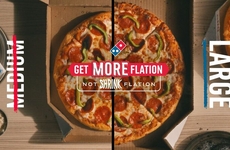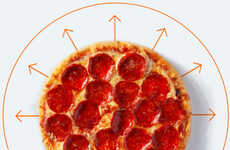
2 Decade Portion Distortion
References: calorielab
30% of Americans are now considered obese, compared to only 15% about 30 years ago. In that same amount of time, food portions have also doubled in size, making the relationships directly proportional. A new campaign by the National Heart, Lung, and Blood Institute offers an excellent visual of this.
The Portion Distortion Quiz gives examples, through photos, of how food portions have essentially doubled over the past two decades, listing alongside the images the average amount of calories per portion then and now, as well as the difference between the two. In addition, they give examples of the types of physical activities, along with how long each must be performed, to make up for the increased caloric intake.
The way food portions have steadily increased over the decades is directly reflected in the dramatic expansion of waistlines. Initially, obesity was a phenomenon mostly of the west, but with the help of globalization, more people in the east are joining those with higher body fat as well.
The Portion Distortion Quiz gives examples, through photos, of how food portions have essentially doubled over the past two decades, listing alongside the images the average amount of calories per portion then and now, as well as the difference between the two. In addition, they give examples of the types of physical activities, along with how long each must be performed, to make up for the increased caloric intake.
The way food portions have steadily increased over the decades is directly reflected in the dramatic expansion of waistlines. Initially, obesity was a phenomenon mostly of the west, but with the help of globalization, more people in the east are joining those with higher body fat as well.
Trend Themes
1. Increasing Food Portions - Exploring strategies to manage the increasing size of food portions.
2. Obesity Epidemic - Developing innovative solutions to address the growing issue of obesity.
3. Globalization of Obesity - Identifying opportunities to combat the global spread of obesity through cultural exchange and education.
Industry Implications
1. Food and Beverage - Leveraging portion control techniques and developing healthier food options.
2. Fitness and Wellness - Creating innovative fitness programs and technologies to promote physical activity and combat obesity.
3. Healthcare - Providing medical interventions, support, and education to tackle obesity-related health issues.
4.4
Score
Popularity
Activity
Freshness























